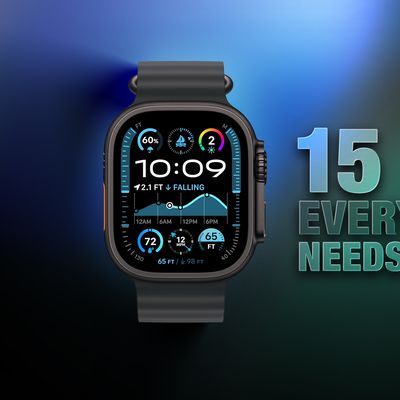 Countless details on the development of the original iPhone have been shared by various Apple employees in several different publications, but a new story on the creation of the phone's first web browser has surfaced courtesy of Francisco Tolmasky, an early iPhone engineer who interviewed with The New York Times.
Countless details on the development of the original iPhone have been shared by various Apple employees in several different publications, but a new story on the creation of the phone's first web browser has surfaced courtesy of Francisco Tolmasky, an early iPhone engineer who interviewed with The New York Times.
Tolmasky joined Apple when he was just 20 years old, working under Steve Jobs to create a mobile web browser for the original iPhone. Jobs regularly gave him feedback on his project, often sending Tolmasky back to the drawing board because his creation wasn't "magical" enough.
"Steve was really adamant, where he said, 'This needs to be like magic. Go back, this isn't magical enough!'" Mr. Tolmasky said about his experience developing the mobile Safari app. "I remember being very frustrated. This was, like, an impossible task."
Countless hours of work resulted in Safari for iPhone, which used WebKit to load web pages on a small screen and allowed users to interact with sites via pinches, swipes, and taps.
As with other accounts of the iPhone's creation, Tolmasky details the intense security behind the project, explaining how the software team was split into sections focusing on web and apps. "Each one of these things is basically one person," explained Tolmasky, speaking of the original iPhone apps.
In one anecdote, Tolmasky divulges the origin of the iPhone's keyboard, which reportedly came about during a week-long hackathon where Jobs instructed the software team to work only on keyboard prototypes. The engineer who won the hackathon was assigned to the keyboard permanently.
According to Tolmasky, Apple's original iPhone Maps app was a last minute addition to the device, as Jobs decided the app should be added just a few weeks before the smartphone was first introduced at the Macworld Expo in January of 2007. It only took his teammate, Chris Blumenberg, a week to have a workable prototype.
"Within a week he had something that was working, and in two weeks he had something to show at Macworld that we were showing," Mr. Tolmasky said. "That was the kind of effect Steve could have on you: This is important, this needs to happen, and you do it."
Tolmasky left Apple shortly after the original iPhone was released as the company no longer felt like a startup, and now he works as a mobile game designer. His most recent creation, Bonsai Slice [Direct Link], was released today. Tolmasky's full interview and additional details on his game can be found in the original NYT piece.





















Top Rated Comments
Being able to render full web pages on a device so small was revolutionary. All previous attempts at mobile web browsing were an affront to god and nature.
People take the experience for granted now but it truly was amazing back then.
chump change for the guy who wrote the first iphone safari... he deserves it all.
Steve would've allowed this. :cool:
steve jobs so boss. sucks for Margaret
Consider things from his perspective: during the development of the iPhone he was working on a tiny team and had complete ownership of an entire app. That is thoroughly start-up like.
In the original NYT article that is not even a direct quote from him, but the reporter's interpretation of what he said. Given that the article also indirectly reports him giving a "rare window into the companys start-up-like product development," the "no longer felt like a start-up" paraphrase makes perfect sense in context:
"Mr. Tolmasky said he left Apple in late 2007 because by then, the iPhone had become such a success that the team had to grow and priorities changed. It no longer felt like a start-up, so he left to start his own."
Clearly, he's someone who likes to own a project, not share it with a team of 10 or 20. He prefers broad-stroke inventing to focused work in a narrower niche. That kind of self-knowledge as a developer is the exact opposite of immature and weird. It's mature and wonderful and all too rare.
I am sure he is ten times as happy and productive doing what he does now as he would have been as one cog in the machine at Apple. And there are plenty of developers who prefer to have highly-focused expertise and responsibilities. I am sure one of them is being far more effective in his old job than he would have been.
The whole workforce wins when people are smart enough to put themselves in situations that play to their strengths.